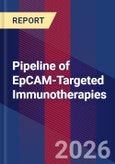Epithelial cell adhesion molecule (EpCAM) is a transmembrane glycoprotein mediating Ca2+-independent cell-cell adhesion in epithelia. EpCAM is also involved in cell signaling, migration, proliferation, and differentiation. Additionally, EpCAM has oncogenic potential via its capacity to upregulate c-myc and cyclins A & E.
EpCAM is over-expressed in most of epithelial tumors including colon cancer (97.7%), gastric cancer (90.7%), prostate cancer (87.2%), and lung cancer (63.7%). The high-level expression of EpCAM in solid tumors has made it an attractive target for antibody molecules to treat epithelial cancers, particularly adenocarcinomas. However, EpCAM is also highly prevalent on normal cells.
EpCAM is a broadly expressed, validated anti-cancer target that to date has been limited in its development potential due to systemic, on-target off-tumor dose-limiting toxicities.
ADC target options are limited by normal tissue expression. Although EpCAM is an ideal cancer target, it has not been tractable by conventional approaches. Conditional activation could allow ADC technology, effector cell recruiting bispecific antibody or co-stimulatory bispecific antibody technologies to be applied to a wider set of targets. Conventional EpCAM/CD3 bispecific antibodies have shown beneficial clinical outcomes in cancer patients, but have been hampered by dose limiting toxicities due to wide target distribution in normal tissues and potent T cell activation.








